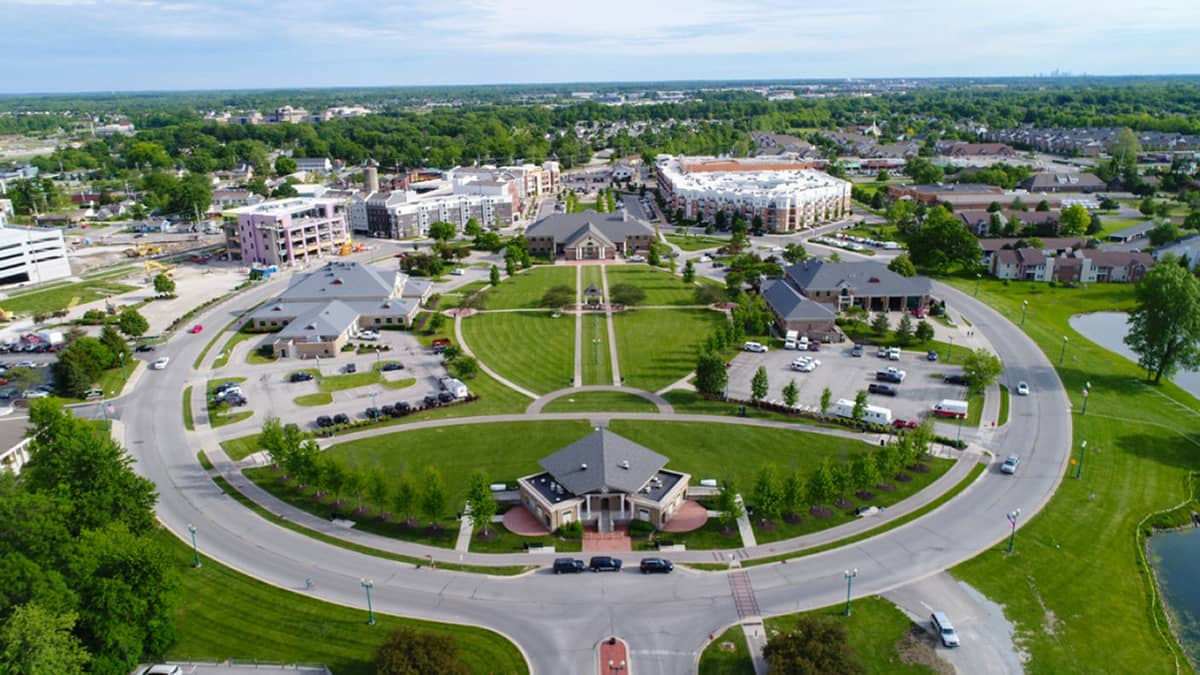The Department of Public Works is responsible for providing snow and ice control for all dedicated streets within city limits.
The primary objective for Fishers Snow and Ice Control is to provide for the safe and orderly movement of traffic. Public Works staff work year-round to prepare and plan for each winter season.
When a snow or ice event is forecast, city personnel is mobilized. Intense storms require a 24-hour response and crews are assigned to 12-hour shifts for the duration of the storm and until the streets are accessible. See the Snow and Ice Control Plan.

Snow Plow Priorities
All roads in the City of Fishers are prioritized into groups for snow removal operations on a snow plow priority map. Priority roads 1-2 will always be maintained with the maximum service level. Priority 3-4 roads will be maintained as the winter storm conditions allow.
- Priority 1: Primary Roads (Blue) facilitate traffic coming into and through Fishers and must remain open to connect public safety facilities throughout the city. This includes roads with hospitals, fire stations, and police stations.
- Priority 2: Secondary Roads (Green) are feeder roads distributing traffic toward subdivision main roads. These higher-traffic roads may have schools, parks, and businesses, or act as the primary road within a subdivision.
- Priority 3: Subdivision Main Roads (Red) are longer roads that make up a residential neighborhood.
- Priority 4: Subdivision Roads (Purple) are shorter roads and cul-de-sacs within a residential neighborhood.
- Other Roads (Not Highlighted): Any road not highlighted is not incorporated within city limits or is identified as a private road. These roads are not serviced by the City of Fishers.
A snow event in Indiana forecasting 2-6 inches of snow may require all available snow and ice control vehicles, equipment, and personnel. Liquid brine may be applied throughout the city in all four priorities of roadway before the snow event. Granular salt may be applied on primary roads. Plowing is required as snow accumulates.
- The primary (blue) and secondary (green) roads will receive all available resources.
- Once cleared, subdivision main (red) and subdivision (purple) roads will receive plow resources.
- If snow accumulates again on the primary and secondary roads, resources will pull out of the neighborhoods to concentrate on the primary and secondary roads.
- The subdivision main roads and the subdivision roads will be cleared after the snow event.
- The Department of Public Works does not apply granular salt in neighborhood subdivisions.
- The only exception will be identified roads with a significant curve or elevation change that creates a hazard.
Report an Issue with Fishers Connect
Winter Safety Tips
- Fishers DPW maintains the streets quickly and efficiently so that you can get home safely! Be sure to drive carefully and let our snowplow drivers do their jobs.
- Be sure to clear all snow off of your vehicle so you can see and be seen by others!
- When it’s snowing or icy, remember to take it slow! Drive below the speed limit and leave plenty of room between you and the car in front of you!
- Many people don’t know, but it’s never smart to use cruise control on a wet surface like during the snow or after it rains.
- Nights get longer in the winter, and that means it’s more important than ever to follow correct driving etiquette. Roadkill peaks in the autumn and winter, so be on the lookout for our furry friends on your way home!
- Watch out for black ice! Roads that appear dry may be very slick. Slow down when approaching intersections, ramps, bridges, etc.
- Rubbing Vaseline on the inside of your car doors can prevent them from freezing over on especially cold mornings.
- Traveling in the winter means packing the essential supplies and knowing your route ahead of time. In case of dangerous weather, it’s important to let someone else know of your estimated arrival times and location.
- Store your local AAA phone number in your phone. It’s always better to be prepared for any automobile emergency
- It takes much longer to slow your car down on icy roads.
- Always remember to check the weather before leaving so you can be fully prepared!
- Leave early and give yourself plenty of time so you can reach your destination safely!
- Help the Fishers Fire Department and adopt a hydrant in your neighborhood! Shoveling around the hydrants near your home ensures that they are easily accessible in case of emergency.
- Clear at least 1 foot around your house exhaust vents and car tailpipe to avoid carbon monoxide poisoning.
- Carbon Monoxide is a silent killer. Prevent CO2 buildup in your house today by making sure all your vents are cleared and the air you’re breathing doesn’t make you feel dizzy or sick.
- It can be tempting on chilly mornings but don’t warm up your car in the garage. Your car releases carbon monoxide, which is odorless and extremely toxic
Jump to another page in this section:


